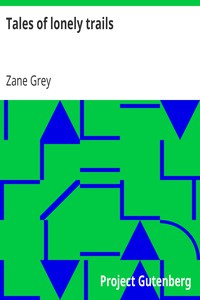Tales of lonely trails by Zane Grey (best affordable ebook reader .TXT) 📗

- Author: Zane Grey
Book online «Tales of lonely trails by Zane Grey (best affordable ebook reader .TXT) 📗». Author Zane Grey
It certainly was worth remembering, I thought, and mentally observed that I would wake up thereafter and listen to the Indian.
"Good luck and bad!" went on Jones. "Snow is what we want, but now we can't find the scent of our lion of last night."
Low growls and snarls attracted me. Both our captives presented sorry spectacles; they were wet, dirty, bedraggled. Emett had chopped down a small pine, the branches of which he was using to make shelter for the lions. While I looked on Tom tore his to pieces several times, but the lioness crawled under hers and began licking her chops. At length Tom, seeing that Emett meant no underhand trick, backed out of the drizzling snow and lay down.
Emett had already constructed a shack for the hounds. It was a way of his to think of everything. He had the most extraordinary ability. A stroke of his axe, a twist of his great hands, a turn of this or that made camp a more comfortable place. And if something, no matter what, got out of order or broken, there was Emett to show what it was to be a man of the desert. It had been my good fortune to see many able men on the trail and round the camp-fire, but not one of them even approached Emett's class. When I said a word to him about his knack with things, his reply was illuminating: "I'm fifty-eight, and four out of every five nights of my life I have slept away from home on the ground."
"Chineago!" called Jim, who had begun with all of us to assimilate a little of the Navajo's language.
Whereupon we fell to eating with appetite unknown to any save hunters. Somehow the Indian had gravitated to me at meal times, and now he sat cross-legged beside me, holding out his plate and looking as hungry as Moze. At first he had always asked for the same kind of food that I happened to have on my own plate. When I had finished and had no desire to eat more, he gave up his faculty of imitation and asked for anything he could get. The Navajo had a marvelous appetite. He liked sweet things, sugar best of all. It was a fatal error to let him get his hands on a can of fruit. Although he inspired Jones with disgust and Jim with worse, he was a source of unfailing pleasure to me. He called me "Mista Gay" and he pronounced the words haltingly in low voice and with unmistakable respect.
"What's on for today?" queried Emett.
"I guess we may as well hang around camp and rest the hounds," replied Jones. "I did intend to go after the lion that killed the deer, but this snow has taken away the scent."
"Shore it'll stop snowin' soon," said Jim.
The falling snow had thinned out and looked like flying powder; the leaden clouds, rolling close to the tree-tops, grew brighter and brighter; bits of azure sky shone through rifts.
Navvy had tramped off to find the horses, and not long after his departure he sent out a prolonged yell that echoed through the forest.
"Something's up," said Emett instantly. "An Indian never yells like that at a horse."
We waited quietly for a moment, expecting to hear the yell repeated. It was not, though we soon heard the jangle of bells, which told us he had the horses coming. He appeared off to the right, riding Foxie and racing the others toward camp.
"Cougie—mucha big—dam!" he said leaping off the mustang to confront us.
"Emett, does he mean he saw a cougar or a track?" questioned Jones.
"Me savvy," replied the Indian. "Butteen, butteen!"
"He says, trail—trail," put in Emett. "I guess I'd better go and see."
"I'll go with you," said Jones. "Jim, keep the hounds tight and hurry with the horses' oats."
We followed the tracks of the horses which lead southwest toward the rim, and a quarter of a mile from camp we crossed a lion trail running at right angles with our direction.
"Old Sultan!" I cried, breathlessly, recognizing that the tracks had been made by a giant lion we had named Sultan. They were huge, round, and deep, and with my spread hand I could not reach across one of them.
Without a word, Jones strode off on the trail. It headed east and after a short distance turned toward camp. I suppose Jones knew what the lion had been about, but to Emett and me it was mystifying. Two hundred yards from camp we came to a fallen pine, the body of which was easily six feet high. On the side of this log, almost on top, were two enormous lion tracks, imprinted in the mantle of snow. From here the trail led off northeast.
"Darn me!" ejaculated Jones. "The big critter came right into camp; he scented our lions, and raised up on this log to look over."
Wheeling, he started for camp on the trot. Emett and I kept even with him. Words were superfluous. We knew what was coming. A made—to—order lion trail could not have equalled the one right in the back yard of our camp.
"Saddle up!" said Jones, with the sharp inflection of words that had come to thrill me. "Jim, Old Sultan has taken a look at us since break of day."
I got into my chaps, rammed my little automatic into its saddle holster and mounted. Foxie seemed to want to go. The hounds came out of their sheds and yawned, looking at us knowingly. Emett spoke a word to the Navajo, and then we were trotting down through the forest. The sun had broken out warm, causing water to drip off the snow laden pines. The three of us rode close behind Jones, who spoke low and sternly to the hounds.
What an opportunity to watch Don! I wondered how soon he would catch the scent of the trail. He led the pack as usual and kept to a leisurely dog—trot. When within twenty yards of the fallen log, he stopped for an instant and held up his head, though without exhibiting any suspicion or uneasiness.
The wind blew strong at our backs, a circumstance that probably kept Don so long in ignorance of the trail. A few yards further on, however, he stopped and raised his fine head. He lowered it and trotted on only to stop again. His easy air of satisfaction with the morning suddenly vanished. His savage hunting instinct awakened through some channel to raise the short yellow hair on his neck and shoulders and make it stand stiff. He stood undecided with warily shifting nose, then jumped forward with a yelp. Another jump brought another sharp cry from him. Sounder, close behind, echoed the yelp. Jude began to whine. Then Don, with a wild howl, leaped ten feet to alight on the lion trail and to break into wonderfully rapid flight. The seven other hounds, bunched in a black and yellow group, tore after him filling the forest with their wild uproar.
Emett's horse bounded as I have seen a great racer leave the post, and his desert brothers, loving wild bursts of speed, needing no spur, kept their noses even with his flanks. The soft snow, not too deep, rather facilitated than impeded this wild movement, and the open forest was like a highway.
So we rode, bending low in the saddle, keen eyes alert for branches, vaulting the white—blanketed logs, and swerving as we split to pass the pines. The mist from the melting snow moistened our faces, and the rushing air cooled them with fresh, soft sensation. There were moments when we rode abreast and others when we sailed single file, with white ground receding, vanishing behind us.
My feeling was one of glorious excitation in the swift, smooth flight and a grim assurance of soon seeing the old lion. But I hoped we would not rout him too soon from under a windfall, or a thicket where he had dragged a deer, because the race was too splendid a thing to cut short. Through my mind whirled with inconceivable rapidity the great lion chases on which we had ridden the year before. And this was another chase, only more stirring, more beautiful, because it was the nature of the thing to grow always with experience.
Don slipped out of sight among the pines. The others strung along the trail, glinted across the sunlit patches. The black pup was neck and neck with Ranger. Sounder ran at their heels, leading the other pups. Moze dashed on doggedly ahead of Jude.
But for us to keep to the open forest, close to the hounds, was not in the nature of a lion chase. Old Sultan's trail turned due west when he began to go down the little hollows and their intervening ridges. We lost ground. The pack left us behind. The slope of the plateau became decided. We rode out of the pines to find the snow failing in the open. Water ran in little gullies and glistened on the sagebrush. A half mile further down the snow had gone. We came upon the hounds running at fault, except Sounder, and he had given up.
"All over," sang out Jones, turning his horse. "The lion's track and his scent have gone with the snow. I reckon we'll do as well to wait until to-morrow. He's down in the middle wing somewhere and it is my idea we might catch his trail as he comes back."
The sudden dashing aside of our hopes was exasperating. There seemed no help for it; abrupt ending to exciting chases were but features of the lion hunt. The warm sun had been hours on the lower end of the plateau, where the snow never lay long; and even if we found a fresh morning trail in the sand, the heat would have burned out the scent.
So rapidly did the snow thaw that by the time we reached camp only the shady patches were left.
It was almost eleven o'clock when I lay down on my bed to rest awhile and fell asleep. The tramp of a horse awakened me. I heard Jim calling Jones. Thinking it was time to eat I went out. The snow had all disappeared and the forest was brown as ever. Jim sat on his horse and Navvy appeared riding up





Comments (0)